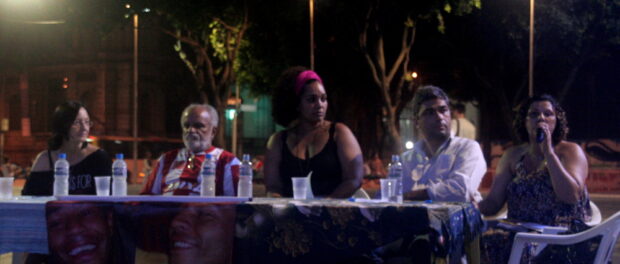
Last Wednesday, November 11, a debate on militarization, exclusion, racism and the Olympics was held in the Cinelândia square, in front of Rio’s City Council, a historic space for protest and political activism in Rio de Janeiro. Organized by the Popular Committee on the World Cup and Olympics, the event brought together different social movements and NGOs concerned with police violence and abuses against the city’s poorer residents, and particularly against black citizens.
The aim of the debate was to generate a space to reflect on how the issues of militarization, increasing segregation and racism in the city of Rio de Janeiro are central to the city model being implemented by Rio’s economic and political elites. The Committee argues that the city of mega-events and mega-projects, of spectacle and speculation is dependent on the systematic repression and containment of poorer citizens for the sake of real estate speculation and capital accumulation. “To reclaim the city for its people” is the central aim of the Committee and the main reason the event was held in a central public square.
The open-air debate was complemented by a photographic exhibition by Luiz Baltar. The photos show moments of police violence and peaceful resistance in Rio’s favelas.
The debate opened with a brief presentation by Hertz Leal from the Committee who then passed the microphone to Monique Cruz from the Rio de Janeiro Youth Forum.
Resident of the Manguinhos favela, Cruz described all the different types of control, humiliation and vexation that favela residents live with every day at hands of the Military Police. She told of how youth are restricted from moving around streets and favela spaces where they have grown up, police assaulting children at school for displaying “uncivil behavior,” invading the privacy of favela residents’ and their homes, and confiscating the equipment of community-based media outlets.
Cruz also emphasized how “especially the black youth are seen as enemies that need to be eliminated,” and are systematically killed with the pretext of being a threat to police. She denounced the corruption of both the police and the judiciary, for manipulating homicide court cases and sentencing them as acts of legitimate police self-defense, as in the recent case of the death of Eduardo de Jesus, a 10-year-old who was shot dead in front of his house in Complexo do Alemão. Monique argued that this is an aggression to the memory of the victims and their parents, mentioning the struggle of mothers like Ana Paula Oliveira whose son Jonatha was shot and killed by police in Manguinhos in May last year. On a final note, Cruz added that the legal system and mass media reinforce the racist and exclusionary state machinery.
The second speaker, Deley de Acarí, a poet and one of Rio’s long-time community organizers from the Acari favela in Rio’s North Zone, described the only legacy for Rio’s favelas as that of an increased militarization with a dramatic increase in public investment on security. He contrasted this with the budgetary cuts on other urgent needs such as education and sanitation.
Maria de Lourdes from the United Movement of Street Vendors drew the attention of the debate towards the Municipal Guard, denouncing violence against street vendors, a common profession among low-income Rio residents. Though street vendors have been fighting for years to regularize their jobs, attempting to pass a new law in the state legislative assembly, everyday aggressions against them have only increased in the context of mega-events.
The final speaker as the event extended into the evening was Maren Mantovani, an activist from the Olympics Without Apartheid campaign calling for the Rio 2016 Organizing Committee to cancel its contract with the Israeli security company International Security and Defense Systems. Mantovani, a pro-Palestine activist, explained how the strategies and armament that Rio de Janeiro’s Military Police are employing are imported from the Israeli army. She drew parallels between how Palestinians and favela residents are treated by security forces, being impeded of free circulation and fatally shot under the official pretext of police or military not being sufficiently trained. Montovani highlighted that the military is very well prepared and trained to kill and shoot right at the hearts and the heads of civilians, both in Rio’s favelas and in the Palestinian territories. Montovani also talked about the anti-terrorism law passed in August: “Brazilian members of the government returned from a trip to Israel and designed an anti-terrorist law to secure the World Cup and Olympic Games. They learned there, [in Israel].”
After a few interventions from the audience, the speakers made their last calls for civil society mobilization against the private interests and companies that profit from the militarization of the city. Finally, the Committee proclaimed its full commitment to act as a network and catalyst for social mobilizations that aim at regaining the right to the city understood as full participation in city life by the majority that is being excluded to date. “I’m not excluded from building, I’m not excluded from working. The exclusion we talk about is that of access,” Monique Cruz claimed.


